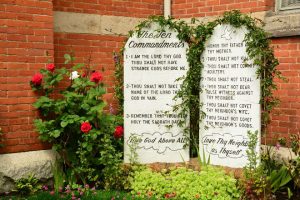
Originally published in September 6, 2017.
The rising political star of Judge Roy Moore in Alabama is another surprise in a political season defined by the unexpected and the unconventional.
On Aug. 15, Moore finished ahead of Senator Luther Strange in a primary election to pick the Republican candidate who will run in November’s general election to fill the seat of former Senator Jeff Sessions. Sessions vacated the seat to become the nation’s attorney general.
Strange, who was Alabama’s attorney general, was appointed by then-Governor Robert Bentley to temporarily fill Sessions’ seat.
Despite Strange being endorsed by President Trump, and perceived as the Republican Party favorite, he was upset by Moore, forcing the upcoming runoff September 26.
Judge Moore, known as the “Ten Commandments Judge” seems to have what resonates politically these days in Alabama and nationally.
Alabama is a deeply Republican, conservative and religious state.
According to a Pew Research survey, Alabama ties with Mississippi as the most religious state in the nation.
According to the Pew survey, 77 percent of Alabamans say religion is “very important” in their lives, 51 percent say they attend religious services at least weekly, 73 percent say they pray daily, and 82 percent say they believe in God “with absolute certainty.”
So this is fertile turf for Moore, who wears his Christian principles on his sleeve and compromises them for no one.
Shortly after being elected chief justice of the Alabama Supreme Court in 2001, he installed a massive Ten Commandments monument in the rotunda of the state judicial building, explaining, “To restore morality we must first recognize the source from which all morality springs.”
Are you cheering with me?
Two years later he was then ousted as chief justice for refusing to remove it.
Moore was re-elected chief justice in 2012. Then, in 2016, he was suspended after issuing an administrative order to state probate judges to not issue marriage licenses to same-sex couples.
In case Moore sounds uppity to you, let’s recall the famous words of George Washington in his farewell address in 1796:
“Of all the dispositions and habits which lead to political prosperity, religion and morality are indispensable supports. … And let us with caution indulge the supposition that morality can be retained without religion. Whatever might be conceded to the influence of refined education on minds of peculiar structure, reason and experience both forbid us to expect that national morality can prevail in exclusion of religious principle.”
I think George Washington would be cheering along with me and many across the nation at the courage of Judge Moore to refuse to roll over on religious principle, as so many have done over recent years. That kowtowing has paved the way to our current ragged state of cultural affairs.
In recent Gallup polling, 24 percent of Americans say they are satisfied with the direction of country. It’s now 12 consecutive years that this Gallup measure of national satisfaction has been below 40 percent.
As I’ve written before, in these troubled, divisive times, our common ground is a widespread dissatisfaction about the state of affairs of the country. After this, we part company regarding what we think needs to change.
As I travel around this nation, I hear from many that what is wrong is the loss of core Christian principles that once held our families together and gave meaning to young people as they started and built their lives.
I think these are the sentiments carrying Judge Roy Moore forward against the establishment — even against a candidate endorsed by our president, who himself was elected by anti-establishment sentiments.
But we need more than just being against the status quo. We have to know what we’re for. Judge Moore is laying it out and Alabamans are buying it.
To prosper in freedom, “religion and morality are indispensable supports.”
COPYRIGHT 2017 STAR PARKER
DISTRIBUTED BY CREATORS.COM
 Star Parker is the founder and president of the Center for Urban Renewal and Education. Contact her at www.urbancure.org.
Star Parker is the founder and president of the Center for Urban Renewal and Education. Contact her at www.urbancure.org.
 CURE News and Clergy Blog News and Commentary for Christians
CURE News and Clergy Blog News and Commentary for Christians



